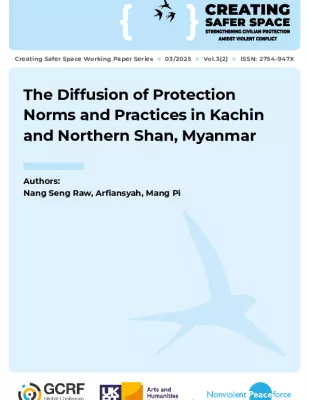This working paper discusses the diffusion of protection norms in Kachin and Northern Shan, two among many conflict
areas of Myanmar. For many decades, Myanmar’s people have experienced protracted violent conflicts, which have forced them to adapt and build protection mechanisms for their own safety and that of others. When ceasefire talks between the state military Tatmadaw and some ethnic armed organisations (EAOs) were initiated in 2010, local civil society organisations (CSOs) invited Nonviolence Peaceforce (NP), an international nongovernmental organisation (INGO) specialising in unarmed civilian protection (UCP), to share experiences and develop mechanisms for the participation of civilians in monitoring potential ceasefire agreements. In the following years, NP assisted various CSOs in the establishment of independent civilian ceasefire monitoring mechanisms and in advocating for the centralisation of protection norms in the monitoring and implementation of any ceasefire agreements. In this process, NP accompanied local CSOs in developing and organising appropriate protection mechanisms, rooted in existing structures and local contexts.
This working paper discusses how protection norms were localised, allowing for an adaptation of protection practices in response to the military coup of 2021. The underlying research asked: How were protection norms diffused? How did actors transform protection norms following Myanmar’s changing political and security landscape? And what norms were maintained? These questions were investigated from July 2023 to June 2024 in Kachin, Northern Shan, and Yangon. The authors conducted face-to-face and online interviews as well as focus group discussions. In this working paper, they argue that protection norms are diffused in conflict areas, when external and internal actors accompany and collaborate with each other and with communities to face threats and violence, to allow norms to be localised and reimagined. A process of ongoing proactive engagement allows both actor types to learn together, exchange ideas, and develop appropriate strategies to protect civilians.
